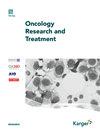PPARγ against tumors by different signaling pathways.
IF 0.3
4区 医学
Q4 Medicine
引用次数: 30
Abstract
The peroxisome proliferator-activated receptor-γ (PPARγ) belongs to the nuclear hormone receptor superfamily, and is expressed in adipose tissue, skeletal muscle, spleen, heart, liver, placenta, lung, and ovary. PPARγ is a critical regulator of inflammation, adipocyte differentiation, glucose homeostasis, and tumorigenesis. The mechanism of PPARγ on tumor suppression is still unclear, but plenty of evidence shows that PPARγ provides new therapeutic targets for cancer. Here we give a review of how PPARγ and its ligands regulate tumorigenesis by different pathways.
PPARγ通过不同的信号通路抑制肿瘤。
过氧化物酶体增殖物激活受体-γ (PPARγ)属于核激素受体超家族,在脂肪组织、骨骼肌、脾脏、心脏、肝脏、胎盘、肺和卵巢中表达。PPARγ是炎症、脂肪细胞分化、葡萄糖稳态和肿瘤发生的关键调节因子。PPARγ抑制肿瘤的机制尚不清楚,但大量证据表明,PPARγ为癌症提供了新的治疗靶点。在此,我们对PPARγ及其配体如何通过不同途径调节肿瘤发生进行综述。
本文章由计算机程序翻译,如有差异,请以英文原文为准。
求助全文
约1分钟内获得全文
求助全文

 求助内容:
求助内容: 应助结果提醒方式:
应助结果提醒方式:


